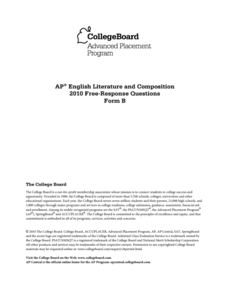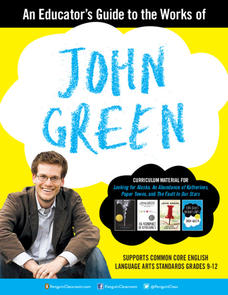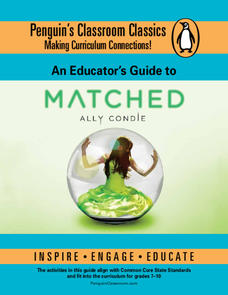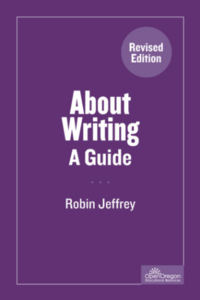College Board
2009 AP® English Literature and Composition Free-Response Questions Form B
Do you have a political agenda? Some authors do. Scholars analyze a piece of work and determine how the author deals with a political or social issue. Responding to two other essay questions, writers create essays exploring how authors...
College Board
2010 AP® English Literature and Composition Free-Response Questions
Three free-response prompts provide scholars an opportunity to practice for the AP® English Literature Composition exam. Using released prompts from the 2010 free-response section, writers craft an essay about the experiences of a...
College Board
2011 AP® English Literature and Composition Free-Response Questions Form B
It's all in the technique. Authors use many techniques to express themselves using writing. Two of the three essay questions require scholars to analyze the literary devices used by the authors and write essays about how these techniques...
College Board
2004 AP® English Language and Composition Free-Response Questions
Shall we agree to disagree? Scholars have the opportunity to choose a topic they feel is controversial in the world and express ideas about it. They complete essays that address the opposite views. In two other essays, they analyze a...
College Board
2006 AP® English Language and Composition Free-Response Questions
What does your lawn decoration say about you? The 2006 AP® English Language and Composition Free-Response Questions offers three prompts in which scholars express themselves through essay writing. One of these tasks includes analyzing...
College Board
2008 AP® English Language and Composition Free-Response Questions
Are your high school scholars ready for college?
Administering the 2008 AP® English Language and Composition Free-Response
Questions tells much about a
pupil's readiness for high level English courses. The resource offers three
questions...
College Board
2009 AP® English Literature and Composition Free-Response Questions
Scholars select a novel or play and craft an essay to discuss what the symbol reveals about the characters or theme. Writers also analyze a passage and a poem to determine how the authors use literary elements to relay their messages.
College Board
2010 AP® English Literature and Composition Free-Response Questions Form B
Home is where the heart is. The 2010 AP® English Literature and Composition Free-Response Questions Form B require scholars to think about what home really is. They look at how a character leaves home, yet home remains within the...
College Board
2011 AP® English Literature and Composition Free-Response Questions
A packet of materials from the 2011 AP® exam provides scholars with an opportunity to examine scored sample essays for the three free-response questions. Included are the prompts, the rubric, scoring guides and sample papers.
College Board
2005 AP® English Language and Composition Free-Response Questions
Should people only have what they need? Questions from the 2005 AP® English Language and Composition Free-Response section asks scholars to write essays evaluating the argument that those who are more fortunate should give all excess...
College Board
2006 AP® English Language and Composition Free-Response Questions Form B
Should voting be a right or a requirement? 2006 AP® English Language and Composition Free-Response Questions Form B includes a prompt in which scholars take a stand on compulsory voting and complete an essay expressing their thoughts....
College Board
2007 AP® English Language and Composition Free-Response Questions Form B
Do museums offer eyes into the past? Scholars synthesize sources to make a claim in an essay about the importance each museum artifact deserves. Pupils also write to analyze journalist level of ethics as well as a speech by Wendell...
College Board
2007 AP® English Language and Composition Free-Response Questions
Looking to stretch the minds of your scholars? The 2007 AP® English Language and Composition Free-Response
Questions offer readers the opportunity to respond to reading at a higher level than many other high school resources. Writers...
North Carolina Consortium for Middle East Studies
Using Drama to Address Social Justice Issues in School and the Community
Artists, musicians, and dramatists have long been the leaders in the quest for social justice. To gain an understanding of the power of the arts to address social issues, class members listen to a reading of Drew Daywalt's The Day the...
Penguin Books
An Educator’s Guide to Ruta Sepetys
Historical fiction novels give readers a chance to step into someone else's shoes. An educator's guide from Penguin Common Core Lesson Plans provides resources to accompany three historical fiction novels written by Ruta Sepetys: Between...
Black History Month Report
Black History Month Report
As part of Black History Month, class members investigate in depth the life and work of an African American musician.
National Constitution Center
AP English Language—Precision of Language
Say what you mean and mean what you say. The Precision of Language addresses the importance of words, especially when they concern a person's rights. Scholars take a look at many different examples and complete questions analyzing the...
National Constitution Center
AP English Language—Argument
All things are subject to interpretation ... and that includes the Bill of Rights. Scholars work through activities to analyze and consider various interpretations and perspectives of the rights listed in the Constitution. They complete...
Penguin Books
An Educator’s Guide to the Works of John Green
The novels of John Green cover the gamut of teenager emotions. A guide to his works provides classroom lesson plans for the novels Looking for Alaska, An Abundance of Katherines, The Fault in Our Stars, and Paper Towns. Each...
Penguin Books
An Educator's Guide to Matched by Ally Condie
Even supposed Utopian societies have their flaws. Using an educator's guide, individuals explore the society Ally Condie creates in Matched. Reflective writing prompts double as discussion questions and cover key themes in the novel, as...
Benjamin Franklin Tercentenary
From Ben’s Pen to Our Lives
What would Ben do? Jumping off from the pseudonymous letters Ben Franklin fooled his older brother into publishing when he was still a teenager, young literary lovers dive into acting, writing, and addressing a local issue with wit and...
Open Oregon Education
The Word on College Reading and Writing
Many people struggle putting their words into writing. However, writing does not have to be difficult. The Word on College Reading and Writing offers all areas of support for writers and readers. The text takes literature lovers all the...
Open Oregon Educational Resources
About Writing: A Guide
Ever wish writing was as easy as 1,2,3? About Writing: A Guide outlines the steps to successful writing. The guide begins by explaining the types of writing and then takes readers through the process. The guide even includes a section...
Benjamin Franklin Tercentenary
Reading the Work of B. Franklin, Printer
Placing Ben Franklin’s ideas about a free press next to those embodied in the First Amendment sheds light on both. Learners interpret and compare two primary sources and then examine them in the light of a contemporary survey about...

























